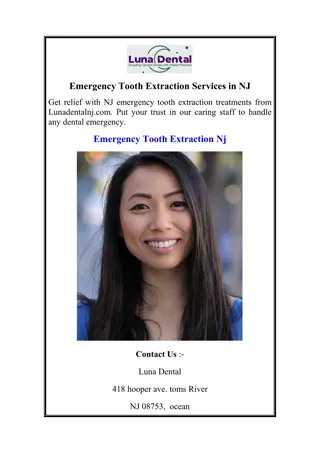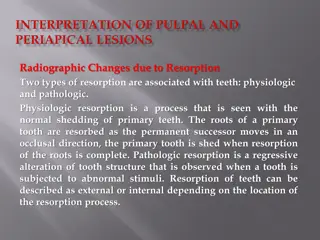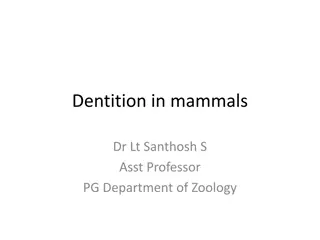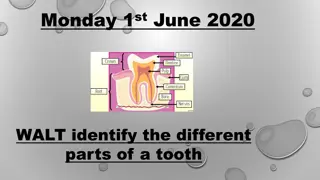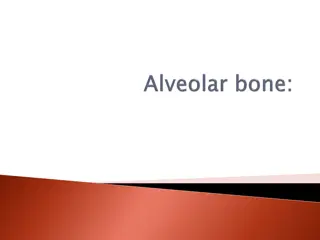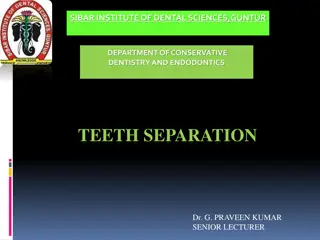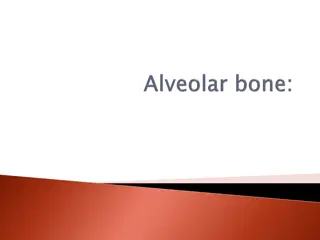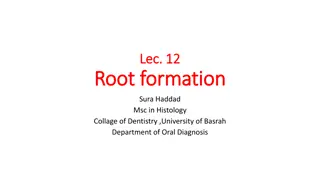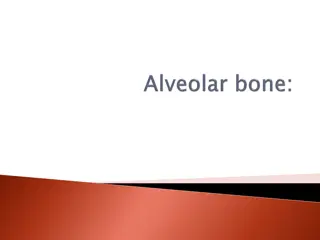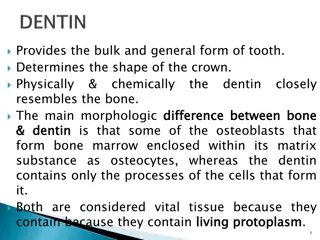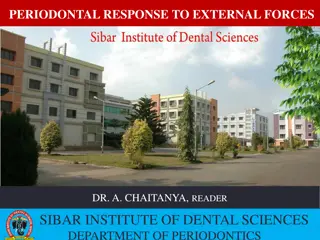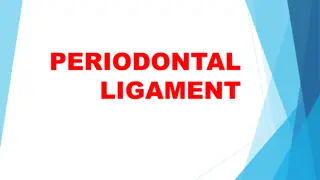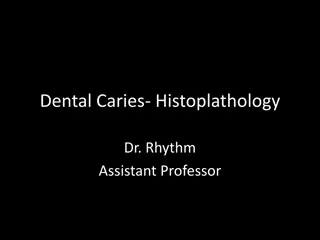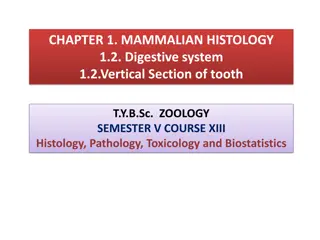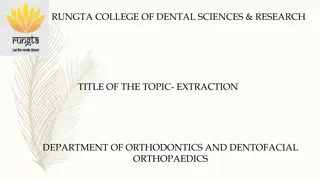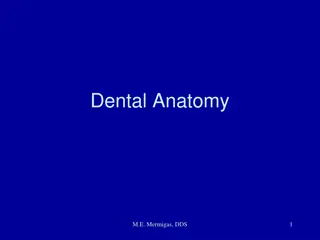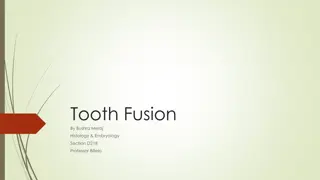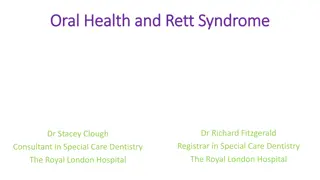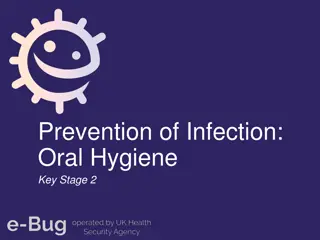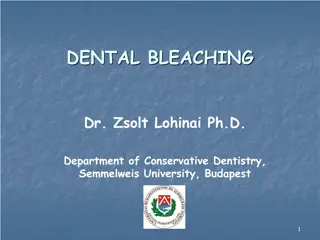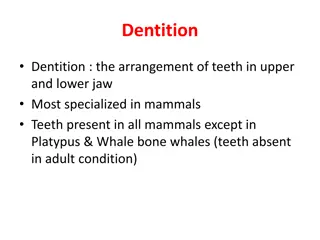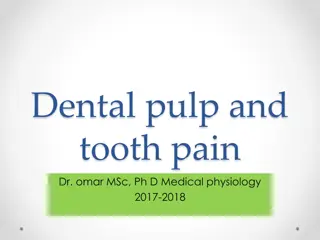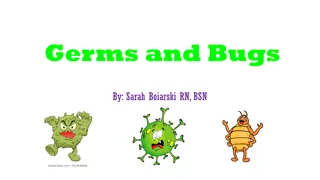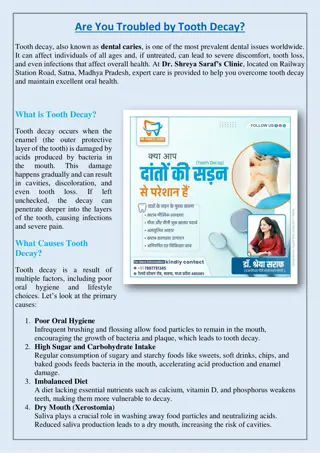Understanding the Development of Occlusion and Dentition
Exploring the stages of tooth development, eruption, theories, and keys to normal occlusion. Learn about primary and permanent dentition, dental formulae, dental lamina, odontogenic cells, and enamel organ formation in the process of tooth development.
6 views • 108 slides
DEVELOPMENTAL STAGES
The developmental history of a tooth is segmented into distinct stages, namely the bud, cap, and bell stages. Each stage represents critical morphological changes in tooth development, from the initial formation of tooth buds to the differentiation of enamel organs and dental papilla. Understanding
6 views • 33 slides
Emergency Dentist Donvale
When a tooth-ache develops, there are very few things that will settle it. Over the counter analgesic medications can dull the pain for a short period of time but it won\u2019t alleviate the pain completely nor will it solve the underlying problems. When a tooth pulp\/ nerve becomes inflamed due to
2 views • 7 slides
Emergency Tooth Extraction Services in NJ
Get relief with NJ emergency tooth extraction treatments from Lunadentalnj.com. Put your trust in our caring staff to handle any dental emergency.\n\n\/\/lunadentalnj.com\/services\/
4 views • 1 slides
Best Wisdom Tooth Surgery in Boon Keng
Absolute Family Dental serves the Best Wisdom Tooth Surgery in Boon Keng. They listen to you, and their aim to provide ethical and caring dental services for every patient at affordable prices. Every patient will be treated with the utmost privacy and assured of the highest standard of cross-infecti
2 views • 6 slides
Tooth Replacement Market Trend to Reach $30.6 Billion by 2031
The adoption of digital technologies in dentistry, such as X-rays, intraoral scanners, digital impressions, and CAD\/CAM, among others, has led to improved accuracy and efficiency in diagnosis, improved treatment planning, reduction of human error, and personalized treatment solutions. Due to improv
0 views • 2 slides
Understanding Radiographic Changes Due to Tooth Resorption
Tooth resorption can be classified into physiologic and pathologic types, with external and internal resorption processes affecting teeth differently. Physiologic resorption is natural during primary teeth shedding, while pathologic resorption is triggered by abnormal stimuli. External resorption oc
0 views • 13 slides
Mammalian Dentition and Tooth Structure Exploration
Understanding dentition in mammals sheds light on their evolution, classification, age approximation, and dietary habits. The arrangement of teeth, tooth structure, development, and types of mammalian teeth are discussed, highlighting unique features like thecodont attachment, enamel coating, and de
2 views • 16 slides
Dental Developmental Stages: Bud, Cap, and Bell Stages Explained
The developmental history of a tooth is intriguingly divided into distinct morphologic stages - the bud, cap, and bell stages. Each stage represents a crucial phase in tooth development, from the initial formation of tooth buds to the intricate differentiation of enamel organs and dental papilla. Un
1 views • 40 slides
Understanding the Different Parts of a Tooth
Explore the structure of a tooth by learning about its various parts such as enamel, dentine, pulp, and more. Discover the difference between the crown and root, and engage in interactive activities like labeling diagrams and creating models to enhance your understanding. Watch a video for a detaile
0 views • 7 slides
Understanding the Role of Alveolar Process in Dental Development
The alveolar process in the upper and lower jaw plays a vital role in housing, supporting, and protecting teeth. It anchors tooth roots, facilitates tooth movement for proper occlusion, absorbs and distributes occlusal forces, supplies vessels to the periodontal ligament, and aids in tooth eruption.
1 views • 28 slides
Tooth Separation in Conservative Dentistry and Endodontics: Methods and Importance
Tooth separation is essential in restorative procedures to enhance convenience, achieve proper contacts and contours, improve operative treatment outcomes, and maintain oral health. This process involves slightly moving teeth apart or closer, or changing their spatial position. Different methods suc
1 views • 28 slides
Structure and Functions of the Alveolar Process in Jaw Anatomy
The alveolar process in the upper and lower jaw is responsible for housing the roots of teeth, supporting tooth eruption, providing attachment for facial muscles, and aiding in mastication. During fetal development, the alveolar process forms and separates tooth germs, leading to the differentiation
3 views • 26 slides
Root Development in Tooth Growth Process
Root formation plays a crucial role in the development of teeth, starting after enamel and dentin formation at the cementoenamel junction. Hertwig's epithelial root sheath (HERS) molds the shape of roots, initiating radicular dentin formation. The cervical loop forms an epithelial diaphragm, narrowi
0 views • 23 slides
Understanding Veneers and Laminates in Dentistry
Patients are increasingly seeking aesthetic treatments for anterior teeth, leading to the popularity of veneers and laminates. Veneers are tooth-colored layers applied to restore defects and discoloration, offering a less invasive and durable alternative to full crowns. The process involves applying
4 views • 55 slides
Understanding the Role of Alveolar Process in Dental Support
The alveolar process in the upper and lower jaw plays a crucial role in supporting teeth, anchoring them to the alveoli with Sharpey's fibers. It helps in tooth movement for proper occlusion, absorbs and distributes occlusal forces, supplies vessels to the periodontal ligament, and protects both pri
2 views • 42 slides
Understanding the Composition and Structure of Dentin
Dentin is a vital tissue in teeth that provides bulk and shape, resembling bone but with distinct differences. It is yellowish, slightly elastic, and consists of inorganic hydroxyapatite and organic materials. Tubules within dentin contain odontoblast processes and follow a curved course throughout
0 views • 42 slides
Periodontal Response to External Forces in Periodontics
Adaptive capacity of the periodontium in response to occlusal forces is variable, influenced by factors like magnitude, direction, duration, and frequency. Trauma from occlusion occurs when occlusal forces exceed tissue's adaptive capacity, leading to tissue injury. It is classified into acute and c
0 views • 40 slides
Best Wisdom tooth surgery in Orchard
If you\u2019re looking for Wisdom tooth surgery in Orchard, contact Singapore Dental Implant Centre. They offer comprehensive services from all fields of dentistry. From dental implants and wisdom tooth surgery to root canal treatments and dental cro
0 views • 6 slides
Understanding Periodontal Ligament: Composition, Functions, and Structure
The periodontal ligament (PDL) is a complex tissue that surrounds a tooth root and connects it to the alveolar bone. It plays a crucial role in tooth support and function. This comprehensive guide covers the composition, principle fibers, blood supply, nerve supply, and lymphatic drainage of the PDL
2 views • 33 slides
Tips for Healthy Teeth and Mouth
Regular oral hygiene practices are essential for maintaining healthy teeth and gums. Proper brushing after meals, regular flossing, and a balanced diet can help prevent tooth decay caused by plaque buildup and bacterial growth. Understanding the parts of a tooth and the importance of good oral healt
0 views • 14 slides
Quality Education for a Healthier Scotland - Smile4life Initiatives and Oral Health Awareness
Explore Smile4life's programs focused on promoting oral health across Scotland. Learn about giving health advice, understanding the importance of oral health, and combating tooth decay through education. Discover key messages on diet, hidden sugars, and tooth decay prevention. Dive into the findings
0 views • 30 slides
Understanding Dental Caries: Causes and Prevention
Dental caries, also known as tooth decay, is a common microbial disease affecting teeth, characterized by demineralization and destruction of tooth tissue. This comprehensive guide explores the causes, progression, and prevention strategies of dental caries, including demineralization and reminerali
0 views • 33 slides
Mammalian Tooth Structure: Vertical Section Overview
Mammalian teeth consist of hard tissues (enamel, dentine, cementum) and soft tissue (tooth pulp). The enamel is the hardest, dentine surrounds the pulp cavity, and cementum covers the dentine and connects to the alveolar bone. Tooth pulp provides support, nourishment, and defense mechanisms. Support
1 views • 7 slides
Extraction in Orthodontics and Dentofacial Orthopedics: Comprehensive Overview
Painless extraction of teeth is crucial in orthodontic treatment for achieving normal occlusion and creating space in the dental arch. Historical background traces the evolution of extraction in orthodontics. The need for extraction is determined by factors like arch length-tooth material ratio, int
0 views • 38 slides
Understanding Reservoirs of Germs in Healthcare Environments
Reservoirs of germs in healthcare settings can be found in various places such as water, wet surfaces, dry surfaces, and medical devices. Understanding where germs thrive is crucial for infection control strategies in healthcare facilities. This session delves into the importance of recognizing pote
0 views • 20 slides
Dental Anatomy and Nomenclature by M.E. Mermigas, DDS
Detailed images and descriptions providing insight into dental anatomy, nomenclature, deciduous and permanent teeth, crown and root structure, dentin composition, pulp chamber and canal features, tooth crown characteristics, and individual tooth types (incisor, canine, premolar, molar).
0 views • 40 slides
Understanding Tooth Fusion in Dentistry
Tooth fusion is the merging of two tooth germs into a single large crown, which can be complete or incomplete depending on the developmental stage. It can affect primary dentition, mostly incisors and canines. Differentiating fusion from gemination involves examining the pulp chambers. Causes may in
0 views • 9 slides
Understanding Oral Health and Tooth Care for Children
Explore the importance of oral health in children, covering topics such as healthy teeth and gums, baby teeth and adult teeth development, new teeth eruption, tooth decay prevention, and the benefits of sugar-free foods. Learn how to maintain proper oral hygiene to ensure a lifetime of healthy smile
0 views • 20 slides
Importance of Oral Hygiene and Preventing Tooth Decay in Children
Understanding the significance of oral hygiene and preventing tooth decay in children is crucial for their overall health. By learning about dental plaque, causes of tooth decay, effective teeth brushing techniques, and the impact of sugary foods and drinks, children can take steps to maintain good
0 views • 21 slides
Understanding Tooth Discolorations and Treatment Options
Explore the causes of tooth discolorations, including both exogenous and endogenous factors, along with the effects of age and various dental conditions. Learn about the importance of tooth shade genuineness and the demand for teeth whitening for improved aesthetics and self-confidence. Discover the
0 views • 25 slides
Understanding Antibiotics and Their Effects on Germs
Explore the world of antibiotics and their impact on bacteria, fungi, viruses, and mild bacterial infections. Delve into the chemistry of antibiotics, their mechanisms, and how they combat various germs. Learn about the treatments involving antibodies and specific conditions like Helicobacter pylori
0 views • 18 slides
Healthy & Safe Swimming Week - May 21-27, 2018
In observance of Healthy & Safe Swimming Week, remember not to swallow pool water, as it can contain harmful germs that may cause illness. Proper maintenance of pools and spas is crucial to prevent bacterial growth, including Legionella. Take precautions to keep germs out of the water, such as ensur
0 views • 4 slides
Safety Guidelines for Animal Exhibits at Fairs
Remind visitors to follow safety guidelines at animal exhibits to prevent the spread of germs and protect their health. Signs instruct not to eat, drink, or touch animals, and to avoid sitting on the ground in animal areas. Emphasize the importance of hand hygiene and carrying children who cannot wa
0 views • 7 slides
Mammalian Dentition and Tooth Structure
Dentition refers to the arrangement of teeth in the upper and lower jaw of mammals. Most mammals have specialized teeth, with some exceptions like the Platypus and Baleen whales. The structure of a mammalian tooth includes the crown, root, and neck, made up of dentine, enamel, and cement. Tooth deve
0 views • 13 slides
Understanding Dental Caries Development and Factors Affecting Tooth Decay
Dental caries, commonly known as tooth decay, is a result of localized chemical dissolution of the tooth surface due to metabolic events in the biofilm. Factors like host susceptibility, plaque formation, diet, and time play a crucial role in the carious process. Tooth morphology, position of teeth,
0 views • 23 slides
Understanding Dental Pulp and Tooth Pain: A Comprehensive Overview
Dental pulp, a soft connective tissue, plays a crucial role in tooth health. It consists of various cells and components like collagen, proteins, and growth factors. The innervation of dental pulp by sensory fibers influences pain perception, with different types of nerve fibers implicated in differ
0 views • 23 slides
Understanding and Preventing Communicable Diseases
Communicable diseases, also known as contagious or infectious diseases, are caused by germs such as viruses, bacteria, fungi, and parasites. These illnesses spread from person to person through various means like body fluids and can have different treatment approaches. It is essential to know how th
0 views • 34 slides
Understanding Germs and Bugs: Protecting Yourself and Others
Explore the world of germs and bugs with valuable insights from Sarah Boiarski, RN, BSN. Learn what germs are, how they spread, and the importance of proper hygiene practices to prevent illnesses. Discover how to wash your hands effectively and stop the spread of germs. Also, delve into the topic of
0 views • 9 slides
Treatement of Tooth Decay - Saraf Dental Clinic
Are you troubled by tooth decay? Visit Dr. Shreya Saraf, an expert in Periodontology, located at Railway Station Road, Satna, Madhya Pradesh. Tooth decay is caused by poor oral hygiene, sugary diets, and lack of dental care. Get advanced, personalize
2 views • 4 slides



